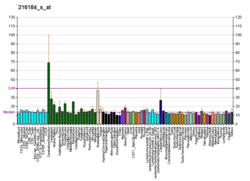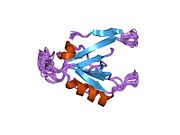RIMS1

Regulating synaptic membrane exocytosis protein 1 is a protein that in humans is encoded by the RIMS1 gene.[3][4][5]
Function
[edit]RAB3A (MIM 179490), a member of the Ras superfamily of genes, is a synaptic vesicle protein that regulates synaptic vesicle exocytosis. MUNC13 (UNC13; MIM 605836) and its isoforms are required for priming synaptic vesicles for exocytosis. The RIM family of active zone proteins likely function as protein scaffolds that help regulate vesicle exocytosis during short-term plasticity.[supplied by OMIM][5]
Clinical significance
[edit]Mutations of the gene cause cone-rod dystrophy 7.
Interactions
[edit]RIMS1 has been shown to interact with:
References
[edit]- ^ "Human PubMed Reference:". National Center for Biotechnology Information, U.S. National Library of Medicine.
- ^ "Mouse PubMed Reference:". National Center for Biotechnology Information, U.S. National Library of Medicine.
- ^ Nagase T, Ishikawa K, Nakajima D, Ohira M, Seki N, Miyajima N, Tanaka A, Kotani H, Nomura N, Ohara O (September 1997). "Prediction of the coding sequences of unidentified human genes. VII. The complete sequences of 100 new cDNA clones from brain which can code for large proteins in vitro". DNA Res. 4 (2): 141–50. doi:10.1093/dnares/4.2.141. PMID 9205841.
- ^ Coppola T, Magnin-Luthi S, Perret-Menoud V, Gattesco S, Schiavo G, Regazzi R (August 2001). "Direct interaction of the Rab3 effector RIM with Ca2+ channels, SNAP-25, and synaptotagmin". J Biol Chem. 276 (35): 32756–62. doi:10.1074/jbc.M100929200. PMID 11438518.
- ^ a b "Entrez Gene: RIMS1 regulating synaptic membrane exocytosis 1".
- ^ a b Ohtsuka T, Takao-Rikitsu E, Inoue E, Inoue M, Takeuchi M, Matsubara K, Deguchi-Tawarada M, Satoh K, Morimoto K, Nakanishi H, Takai Y (August 2002). "Cast: a novel protein of the cytomatrix at the active zone of synapses that forms a ternary complex with RIM1 and munc13-1". J. Cell Biol. 158 (3): 577–90. doi:10.1083/jcb.200202083. PMC 2173811. PMID 12163476.
- ^ Takao-Rikitsu E, Mochida S, Inoue E, Deguchi-Tawarada M, Inoue M, Ohtsuka T, Takai Y (January 2004). "Physical and functional interaction of the active zone proteins, CAST, RIM1, and Bassoon, in neurotransmitter release". J. Cell Biol. 164 (2): 301–11. doi:10.1083/jcb.200307101. PMC 2172332. PMID 14734538.
- ^ a b Betz A, Thakur P, Junge HJ, Ashery U, Rhee JS, Scheuss V, Rosenmund C, Rettig J, Brose N (April 2001). "Functional interaction of the active zone proteins Munc13-1 and RIM1 in synaptic vesicle priming". Neuron. 30 (1): 183–96. doi:10.1016/s0896-6273(01)00272-0. hdl:11858/00-001M-0000-0012-F596-C. PMID 11343654. S2CID 155875.
- ^ Fukuda M (April 2003). "Distinct Rab binding specificity of Rim1, Rim2, rabphilin, and Noc2. Identification of a critical determinant of Rab3A/Rab27A recognition by Rim2". J. Biol. Chem. 278 (17): 15373–80. doi:10.1074/jbc.M212341200. PMID 12578829.
- ^ "Protein unc-13 homolog A". UniProt.
- ^ Sun L, Bittner MA, Holz RW (October 2003). "Rim, a component of the presynaptic active zone and modulator of exocytosis, binds 14-3-3 through its N terminus". J. Biol. Chem. 278 (40): 38301–9. doi:10.1074/jbc.M212801200. PMID 12871946.
Further reading
[edit]- Kelsell RE, Gregory-Evans K, Gregory-Evans CY, Holder GE, Jay MR, Weber BH, Moore AT, Bird AC, Hunt DM (1998). "Localization of a gene (CORD7) for a dominant cone-rod dystrophy to chromosome 6q". Am. J. Hum. Genet. 63 (1): 274–9. doi:10.1086/301905. PMC 1377229. PMID 9634506.
- Betz A, Thakur P, Junge HJ, Ashery U, Rhee JS, Scheuss V, Rosenmund C, Rettig J, Brose N (2001). "Functional interaction of the active zone proteins Munc13-1 and RIM1 in synaptic vesicle priming". Neuron. 30 (1): 183–96. doi:10.1016/S0896-6273(01)00272-0. hdl:11858/00-001M-0000-0012-F596-C. PMID 11343654. S2CID 155875.
- Liu X, Schrager JA, Lange GD, Marsh JW (2001). "HIV Nef-mediated cellular phenotypes are differentially expressed as a function of intracellular Nef concentrations". J. Biol. Chem. 276 (35): 32763–70. doi:10.1074/jbc.M101025200. PMID 11438519.
- Daiho T, Yamasaki K, Saino T, Kamidochi M, Satoh K, Iizuka H, Suzuki H (2001). "Mutations of either or both Cys876 and Cys888 residues of sarcoplasmic reticulum Ca2+-ATPase result in a complete loss of Ca2+ transport activity without a loss of Ca2+-dependent ATPase activity. Role of the CYS876-CYS888 disulfide bond". J. Biol. Chem. 276 (35): 32771–8. doi:10.1074/jbc.M101229200. PMID 11438520.
- Tsuji M, Inanami O, Kuwabara M (2001). "Induction of neurite outgrowth in PC12 cells by alpha -phenyl-N-tert-butylnitron through activation of protein kinase C and the Ras-extracellular signal-regulated kinase pathway". J. Biol. Chem. 276 (35): 32779–85. doi:10.1074/jbc.M101403200. PMID 11438521.
- Dierks H, Kolanus J, Kolanus W (2001). "Actin cytoskeletal association of cytohesin-1 is regulated by specific phosphorylation of its carboxyl-terminal polybasic domain". J. Biol. Chem. 276 (40): 37472–81. doi:10.1074/jbc.M101502200. PMID 11438522.
- Schoch S, Castillo PE, Jo T, Mukherjee K, Geppert M, Wang Y, Schmitz F, Malenka RC, Südhof TC (2002). "RIM1alpha forms a protein scaffold for regulating neurotransmitter release at the active zone". Nature. 415 (6869): 321–6. Bibcode:2002Natur.415..321S. doi:10.1038/415321a. PMID 11797009. S2CID 4424128.
- Ohtsuka T, Takao-Rikitsu E, Inoue E, Inoue M, Takeuchi M, Matsubara K, Deguchi-Tawarada M, Satoh K, Morimoto K, Nakanishi H, Takai Y (2002). "Cast: a novel protein of the cytomatrix at the active zone of synapses that forms a ternary complex with RIM1 and munc13-1". J. Cell Biol. 158 (3): 577–90. doi:10.1083/jcb.200202083. PMC 2173811. PMID 12163476.
- Wang Y, Liu X, Biederer T, Südhof TC (2002). "A family of RIM-binding proteins regulated by alternative splicing: Implications for the genesis of synaptic active zones". Proc. Natl. Acad. Sci. U.S.A. 99 (22): 14464–9. Bibcode:2002PNAS...9914464W. doi:10.1073/pnas.182532999. PMC 137906. PMID 12391317.
- Fukuda M (2003). "Distinct Rab binding specificity of Rim1, Rim2, rabphilin, and Noc2. Identification of a critical determinant of Rab3A/Rab27A recognition by Rim2". J. Biol. Chem. 278 (17): 15373–80. doi:10.1074/jbc.M212341200. PMID 12578829.
- Wang Y, Südhof TC (2003). "Genomic definition of RIM proteins: evolutionary amplification of a family of synaptic regulatory proteins( small star, filled )". Genomics. 81 (2): 126–37. doi:10.1016/S0888-7543(02)00024-1. PMID 12620390.
- Johnson S, Halford S, Morris AG, Patel RJ, Wilkie SE, Hardcastle AJ, Moore AT, Zhang K, Hunt DM (2003). "Genomic organisation and alternative splicing of human RIM1, a gene implicated in autosomal dominant cone-rod dystrophy (CORD7)". Genomics. 81 (3): 304–14. doi:10.1016/S0888-7543(03)00010-7. PMID 12659814.
- Sun L, Bittner MA, Holz RW (2003). "Rim, a component of the presynaptic active zone and modulator of exocytosis, binds 14-3-3 through its N terminus". J. Biol. Chem. 278 (40): 38301–9. doi:10.1074/jbc.M212801200. PMID 12871946.
- Takao-Rikitsu E, Mochida S, Inoue E, Deguchi-Tawarada M, Inoue M, Ohtsuka T, Takai Y (2004). "Physical and functional interaction of the active zone proteins, CAST, RIM1, and Bassoon, in neurotransmitter release". J. Cell Biol. 164 (2): 301–11. doi:10.1083/jcb.200307101. PMC 2172332. PMID 14734538.
- Beausoleil SA, Jedrychowski M, Schwartz D, Elias JE, Villén J, Li J, Cohn MA, Cantley LC, Gygi SP (2004). "Large-scale characterization of HeLa cell nuclear phosphoproteins". Proc. Natl. Acad. Sci. U.S.A. 101 (33): 12130–5. Bibcode:2004PNAS..10112130B. doi:10.1073/pnas.0404720101. PMC 514446. PMID 15302935.
- Barragan I, Marcos I, Borrego S, Antiñolo G (2005). "Molecular analysis of RIM1 in autosomal recessive Retinitis pigmentosa". Ophthalmic Res. 37 (2): 89–93. doi:10.1159/000084250. PMID 15746564. S2CID 25242611.
- Sisodiya SM, Thompson PJ, Need A, Harris SE, Weale ME, Wilkie SE, Michaelides M, Free SL, Walley N, Gumbs C, Gerrelli D, Ruddle P, Whalley LJ, Starr JM, Hunt DM, Goldstein DB, Deary IJ, Moore AT (2007). "Genetic enhancement of cognition in a kindred with cone–rod dystrophy due to RIMS1 mutation". J. Med. Genet. 44 (6): 373–80. doi:10.1136/jmg.2006.047407. PMC 2740882. PMID 17237123.



